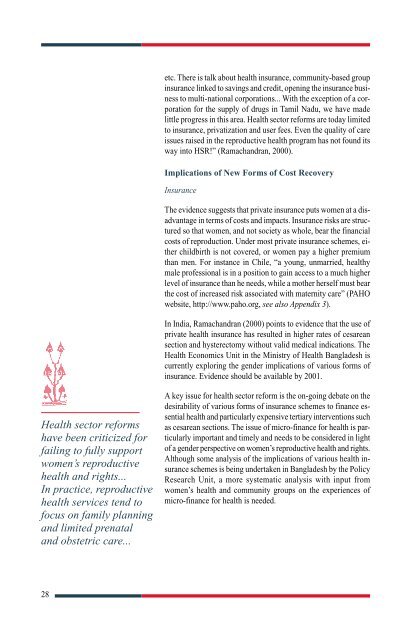Globalization, Health Sector Reform, Gender and ... - Ford Foundation
Globalization, Health Sector Reform, Gender and ... - Ford Foundation
Globalization, Health Sector Reform, Gender and ... - Ford Foundation
- No tags were found...
You also want an ePaper? Increase the reach of your titles
YUMPU automatically turns print PDFs into web optimized ePapers that Google loves.
etc. There is talk about health insurance, community-based groupinsurance linked to savings <strong>and</strong> credit, opening the insurance businessto multi-national corporations... With the exception of a corporationfor the supply of drugs in Tamil Nadu, we have madelittle progress in this area. <strong>Health</strong> sector reforms are today limitedto insurance, privatization <strong>and</strong> user fees. Even the quality of careissues raised in the reproductive health program has not found itsway into HSR!” (Ramach<strong>and</strong>ran, 2000).Implications of New Forms of Cost RecoveryInsuranceThe evidence suggests that private insurance puts women at a disadvantagein terms of costs <strong>and</strong> impacts. Insurance risks are structuredso that women, <strong>and</strong> not society as whole, bear the financialcosts of reproduction. Under most private insurance schemes, eitherchildbirth is not covered, or women pay a higher premiumthan men. For instance in Chile, “a young, unmarried, healthymale professional is in a position to gain access to a much higherlevel of insurance than he needs, while a mother herself must bearthe cost of increased risk associated with maternity care” (PAHOwebsite, http://www.paho.org, see also Appendix 3).In India, Ramach<strong>and</strong>ran (2000) points to evidence that the use ofprivate health insurance has resulted in higher rates of cesareansection <strong>and</strong> hysterectomy without valid medical indications. The<strong>Health</strong> Economics Unit in the Ministry of <strong>Health</strong> Bangladesh iscurrently exploring the gender implications of various forms ofinsurance. Evidence should be available by 2001.<strong>Health</strong> sector reformshave been criticized forfailing to fully supportwomen’s reproductivehealth <strong>and</strong> rights...In practice, reproductivehealth services tend tofocus on family planning<strong>and</strong> limited prenatal<strong>and</strong> obstetric care...A key issue for health sector reform is the on-going debate on thedesirability of various forms of insurance schemes to finance essentialhealth <strong>and</strong> particularly expensive tertiary interventions suchas cesarean sections. The issue of micro-finance for health is particularlyimportant <strong>and</strong> timely <strong>and</strong> needs to be considered in lightof a gender perspective on women’s reproductive health <strong>and</strong> rights.Although some analysis of the implications of various health insuranceschemes is being undertaken in Bangladesh by the PolicyResearch Unit, a more systematic analysis with input fromwomen’s health <strong>and</strong> community groups on the experiences ofmicro-finance for health is needed.28
















